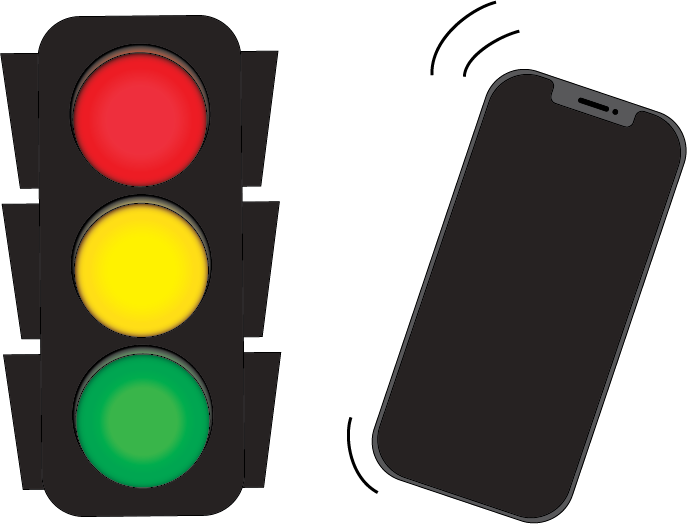Phone policy: Is it effective?
August 31, 2022
In the light of the new school year, new policies have surfaced at Riverside Brookfield High School. One such policy is a new phone system that has been put in place in classrooms throughout the school. When students returned to school in-person for the 2021-2022 school year, phones were often pulled out when class was in session. Now, phones are expected to be either in caddies or completely away in a backpack. In our opinion, the new phone policy at RB has primary-school-like elements. We feel that the implementation of this is beneficial to teachers but different for students.
In middle school–a time when everyone was getting a phone–phone policies were normal. Everyone knew to put it in their backpack, and everyone hoped the teacher would say we were able to play games or do whatever on our phones in class. Now being sophomores, we feel like these rules are still implied and for most, it’s just a common practice. Of course, there are going to be some students who take it out of their backpacks when they are not supposed to, but we feel like it doesn’t happen as often as assumed. Compared to all our classes now, the only time multiple people would have their phones out was if a teacher did not have strict-enough rules regarding phones.
We recall in the first class of our freshman year, we were caught off guard by the amount of students using their phones. In our middle school, phone usage was strictly monitored and basically prohibited, but our peers were able to develop tactics where they could secretly use it when class was in session. More often than not, students can and will use their phones without their teachers noticing. If a student’s phone usage is overlooked, they are more likely to use their phone more discreetly. Without continuously surveilling this system, it won’t be successful–from our perspective–and students will continue to find ways to use their phones under the teacher’s noses.
Throughout freshman year, we had multiple classes that had their own cell phone rules. In our third period class, we would be able to have our phones on our desks or use it at times when we finished work. We liked this freedom that we had, and oftentimes we found ourselves not even using our phones during class because we had access to it. Compared to our fourth period class, the teacher made it clear that her boundaries were to not have phones out, which we understood. Having the ability to have at least some classes that are flexible with phones is important. For us, it made school more enjoyable. If we weren’t able to listen to music at times, we don’t know how we would’ve gotten through last school year.
Depending on the teacher, phone policies do work effectively. In the past, we personally never really used our phones much during class unless we had no other work to complete or we just wanted to listen to music to keep us productive. The new red, yellow, green policy reminds us of color and clip charts back in elementary school that you would have to move depending on your behavior. We feel that for upperclassmen it is already a norm to know what to do with phones since they’ve been in school for longer. For the freshman and sophomore classes, we have a different opinion on the use of this policy. Since underclassmen are still fairly new to high school, it is understandable for teachers to be stricter with phones for younger students. Even if in some cases we can see how the policy was a good idea, in our heads it just seems like something a middle school would do.
We believe that the implementation of this phone policy will be effective for the underclassmen–specifically freshman. For freshmen, the introduction of this policy will become expected of them, and they are more likely to follow the policy in comparison to upperclassmen and sophomores from what we’ve seen. Most middle schools rigorously regulate phone use from the first day of sixth grade, and we know this similar RB policy will be no different to freshman since they will see it as a norm. However, for upperclassmen and sophomores, this is something new. By strictly emphasizing this phone policy to the freshman class, we believe it will become successful, and the policy will become more effective because they’ll understand that it’s expected, while upperclassmen and sophomores are more likely to brush it off.
High school is the transition from childhood to adulthood, and if we want to be treated like adults, we need to start acting like it. We’ve been taught since day one to prioritize our education. In kindergarten, we have been expected to understand how things should function. As students, we need to control our phone usage and understand that when a teacher is teaching, it’s not an appropriate time to use your phone. It is disrespectful to the teacher and signals that a student disregards their time, and as a consequence, the student is going to struggle in the class.
Students who are continuously on their phones should have their own consequences for doing so. It just seems like the whole initiative could have been avoided and used for certain students. High school teaches students to become more independent before graduation. Why do we now have stricter rules regarding our own phones? It feels, in a way, a step back from where we were last year. We think if teachers made their own regulations regarding phone policies in their classroom it would be more effective.
In circumstances of exams or quizzes, a student’s phone should be put in a place where it’s out of reach. Whether it be in phone pockets or a cardboard box, phones should be taken away to avoid cheating. A phone provides unlimited resources for students, but people should utilize those resources when there isn’t a test in front of them. Tests are meant to assess a student’s mastery of the material, so students should ask for help from their teachers when encountering challenging material. Before turning to a device, a student should ask their own teacher first because they are most likely more knowledgeable on the subject than Google is.
We understand that the policy has increased student productivity and motivation within the classroom, and yes, it has stopped me from reaching for our phones once or twice in class, but we had already developed limits for ourselves prior to this new policy. We know that when class is in session, it’s not the best time to use our phones because we are being taught new material that we will need to succeed in future exams and quizzes. Unless we know it’s a fitting time where we’ve completed our schoolwork, we avoid using our phones in class. Other students need to understand the appropriate times when they can utilize their phones. Whether it be for a class game or during free time at the conclusion of class, students need to comprehend that those are suitable times to use your phone.
The policy itself seems replaceable. By that we mean that the administration could just edit it or turn it into something new. This could mean teachers being more lenient or stricter. Honestly, in our humble opinion, we understand the issue and how it would be an annoyance for teachers having to deal with students on their phones. We just feel like we should allow teachers to create their own policies for their classroom, hopefully less similar to elementary school.
Overall, this new policy can be modified to fit the environment of the school. Depending on the student, the phone policy should adapt to how a student behaves with their phone. In retrospect, we believe that this policy has the opportunity to be modified to fit the needs of Riverside Brookfield High School as time goes on.




